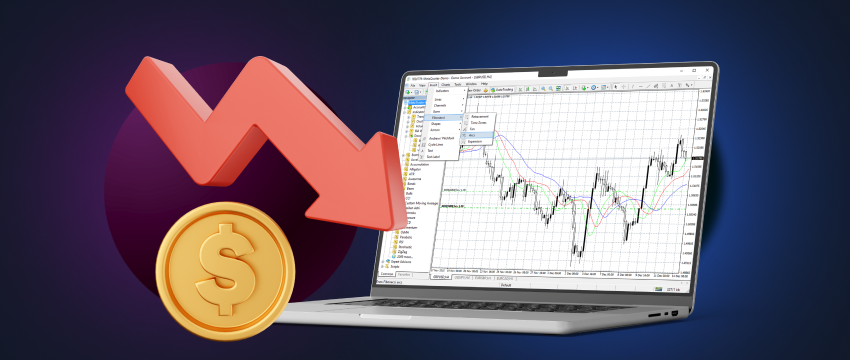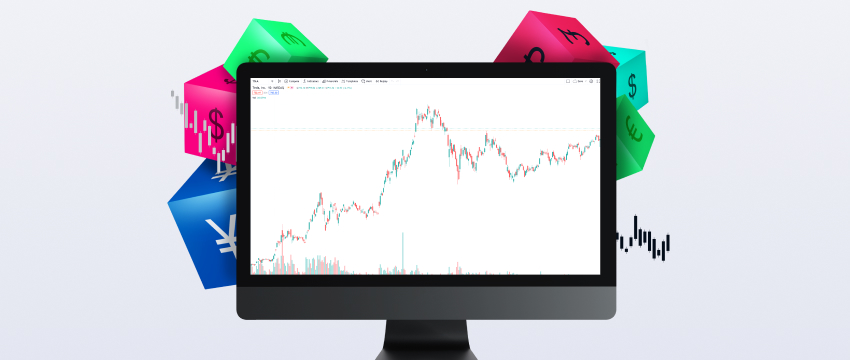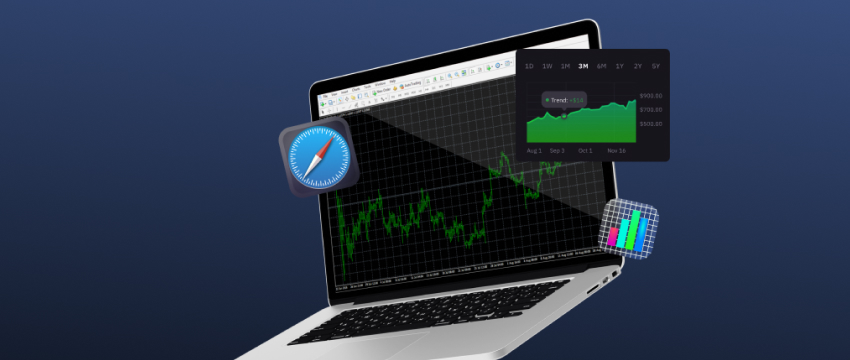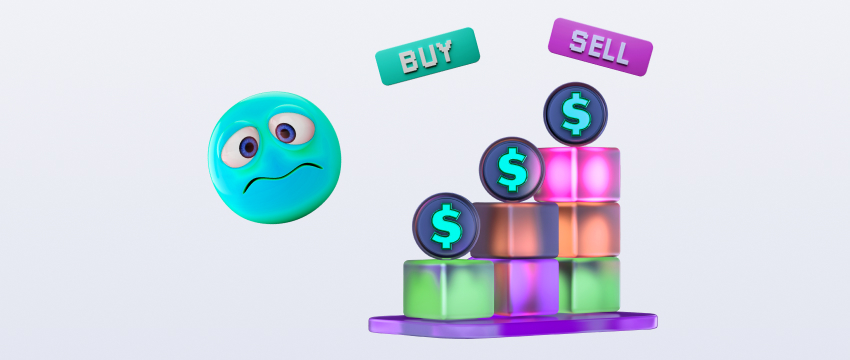O trading de instrumentos financeiros é um evento com um resultado binário. O preço de um ativo só pode subir ou descer - com a subida, tem lucro, e movimentos descendentes provocam perdas. Dado que os preços das ações não têm preferência entre a subida ou a descida, seria de esperar logicamente uma taxa de lucro e perda praticamente igual entre todos os traders, mesmo que todos eles negociassem aleatoriamente sem analisar os mercados. No entanto, quando olhamos para os números reais, vemos que cerca de 90% das pessoas perdem dinheiro a negociar CFDs. Vamos explorar alguns dos motivos para esta taxa de sucesso tão baixa.
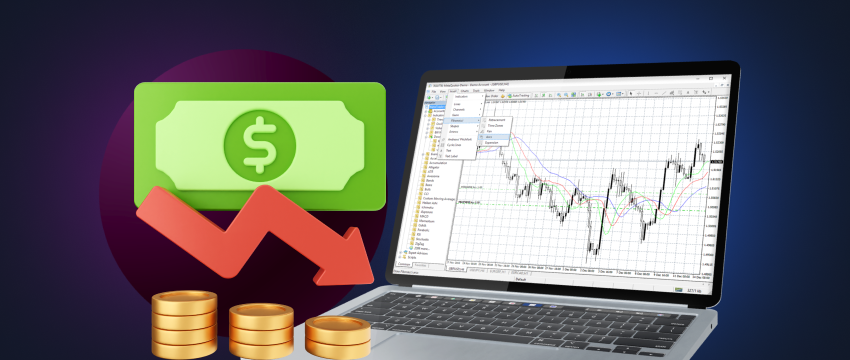
Spread
O spread é o ponto de partida mais óbvio para a disparidade entre o número de traders vencedores e perdedores.
O spread é uma fonte de rendimento necessária para as corretoras financeiras. Pense no spread como se estivesse a iniciar uma corrida com alguns metros de desvantagem. Para ganhar, terá sempre de recuperar a distância perdida. Na prática, isto significa que todas as posições são executadas a um preço inferior ao da cotação de compra, e a um preço superior ao da cotação de venda. Por outras palavras, se abrir e encerrar imediatamente uma posição, terá apenas prejuízo.
Consequentemente, se os traders tiverem um número igual de negociações vencedoras e perdedoras, o resultado final é uma perda sobre o capital investido. É importante compreender este conceito. Dentro da percentagem de traders que ganham ou perdem, existe também uma "perda de peso morto" (deadweight loss) que vai para a corretora. Para ultrapassar o spread, os traders necessitam de uma abordagem mais sofisticada e consciente, sem apostas desmedidas.
Se o spread fosse o único fator a influenciar o número de vencedores e perdedores, essa diferença seria semelhante ao valor médio do spread. No entanto, o spread dos principais pares de moedas não ultrapassa em média os 2 pips - por outras palavras, 0,2%. Portanto, por si só, o spread não pode ser responsável por 90% das perdas entre os traders de CFDs. É claro que os pares de moedas principais têm os spreads mais baixos, mas mesmo assim, o spread dos pares secundários e exóticos não aumenta em duzentas vezes, para não mencionar que esses ativos são negociados com muito menos frequência. Portanto, além do spread, a história é bastante mais complexa.
Comissões
As comissões são semelhantes ao spread, na medida em que também retiram uma parte do valor de todas as transações. Tipicamente, as corretoras determinam o nível de comissão dependendo do ativo. Pode ser algo como $10/lote, por exemplo.
Algumas corretoras preferem aplicar comissões em vez do spread, outras utilizam o spread para substituir as comissões, e existem várias corretoras que aplicam ambas as taxas. De forma similar ao spread, as comissões representam uma pequena perda na conta sobre o respetivo valor da posição. Por outras palavras, as comissões, mesmo em combinação com o spread, não são responsáveis por 90% das pessoas que perdem dinheiro a negociar CFDs.
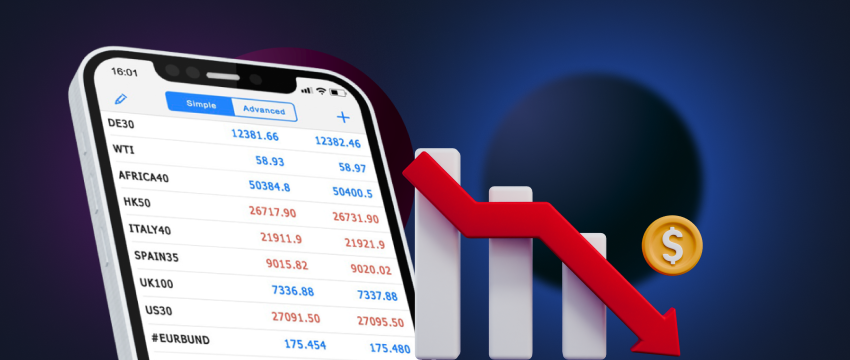
Alavancagem excessiva
A alavancagem permite que os traders abram posições maiores sem necessitarem do montante total de capital inicialmente exigido. Isto aumenta o possível volume das transações, o que significa que os traders podem investir menos para obter retornos semelhantes, ou investir o mesmo para ganhar mais. No entanto, a alavancagem aumenta o potencial de lucro, mas também multiplica o nível de risco e as perdas associadas. O aumento do tamanho dos lotes leva a maiores oscilações de capital, que podem apanhar desprevenidos os traders menos experientes.
É difícil quantificar numericamente a utilização incorreta da alavancagem. Não há nada de errado em tirar partido da alavancagem elevada para diversificar o portfólio, mantendo um nível de margem saudável. No entanto, com demasiada frequência, os traders principiantes aplicam mal esta ferramenta, abrindo apenas um punhado de posições demasiado grandes em relação ao seu saldo, colocando toda a sua conta em risco. A maioria dos principiantes fica deslumbrada pela possibilidade de minimizar os requisitos de margem, e perdem noção do valor total das suas posições, o que leva a perdas inesperadas, especialmente porque o efeito da alavancagem também é transferido para os spreads.
Uso indevido de alavancagem: Um erro comum dos comerciantes principiantes
Subestimar o efeito da alavancagem sobre o spread é provavelmente o principal erro dos traders inexperientes. Um novo trader pode pensar que tem margem suficiente para abrir uma posição com alavancagem, ignorando completamente a perda inicial com que são executadas todas as posições devido ao spread. Por outras palavras, antes de abrir uma posição, os traders devem garantir um nível de margem suficiente, mas reconhecer também a quantia da margem livre que será consumida pelo spread.
Isto é especialmente proeminente com instrumentos voláteis e com spreads elevados, ou mesmo com instrumentos "normais" perto das horas de abertura e encerramento do mercado, quando os spreads aumentam. Posições encerradas segundos após a sua abertura, devido ao facto de o spread ser superior ao nível de margem livre, é infelizmente uma ocorrência comum no dia a dia dos mercados financeiros.
Resumindo, a utilização incorreta da alavancagem devido à inexperiência explica porque é que tantos principiantes perdem dinheiro a negociar CFDs.
Falta de informação

A tomada de decisões informadas durante o trading é a principal diferença entre os melhores traders, e as pessoas que perdem dinheiro. É possível encontrar a melhor corretora com os spreads mais reduzidos e as comissões mais baixas, e aprender a evitar as armadilhas associadas ao excesso de alavancagem. No entanto, sem saber como interpretar e prever a dinâmica do mercado, o trading é nada mais do que um jogo de adivinhação, embora seja possível mitigar o risco.
Não cometer erros de principiante é relativamente simples, mas para lucrar a longo prazo, a educação e o conhecimento serão sempre essenciais para uma jornada de sucesso no trading. A maioria das pessoas perde dinheiro a negociar CFDs porque a aprendizagem exige empenho e disciplina, que apenas conseguimos observar nos traders mais dedicados. Mesmo perante condições desfavoráveis, um trader experiente tem capacidade de "derrotar" qualquer investidor aleatório, mesmo que estes negociem com as melhores corretoras.
Portanto, a falta de conhecimento sobre o trading será sempre o fator determinante, que explica porque é que tantas pessoas perdem dinheiro com CFDs.
Desistir no primeiro obstáculo
Qualquer pessoa que tente negociar pela primeira tem tendência a cometer erros. Recordando o cenário anterior, onde os novatos ativam imediatamente stop-outs (encerramento automático de posições) devido a erros de cálculo do spread, estes traders podem concluir rapidamente que o trading é fraudulento, sem nunca compreenderem totalmente o erro cometido, e acabam por desistir completamente. Desta forma, ignoram uma oportunidade para aprender e transformarem-se em investidores de sucesso, mantendo a absurda percentagem de 90% dos traders que perdem dinheiro.
Conclusão
O trading online tem custos associados, que devem ser suportados para alcançar o sucesso. A única forma de garantir lucros consistentes é tomar decisões informadas, desenvolver competências e compreender as dinâmicas do mercado. Isto significa que apenas os bons traders conseguem lucrar.
Isenção de responsabilidade: Este material destina-se apenas a fins informativos e educativos e não deve ser considerado como conselho ou recomendação de investimento. A T4Trade não se responsabiliza por quaisquer dados fornecidos por terceiros referenciados ou hiperligados nesta comunicação.
